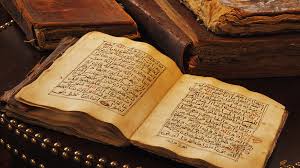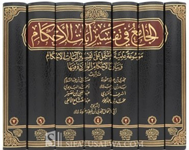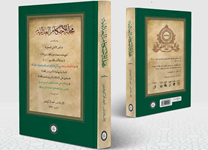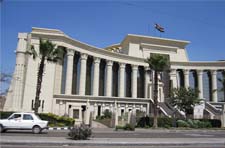ARLO Articles

|
The History of Legal Defense in Afghanistan
This article examines the history of legal defense (advocacy) in Afghanistan, focusing on the role this institution has played in promoting justice from the reign of Mohammad Zahir Shah to the post-2001 era of the Islamic Emirate. It also explores the challenges faced by legal advocates in Afghanistan and provides recommendations for enhancing the profession and adv... |

|
Family Law
This article analyzes family law in Afghanistan, with a particular focus on the influence of Islamic law and local traditions. It begins by defining family law and highlighting its importance in regulating familial relationships. The article provides a historical overview of the development of family law in Afghanistan, including key legal changes during various peri... |

|
Penology from Historical and Islamic Law Perspectives
This article reviews Penology's role in legal systems, covering the history of punishment, its goals—deterrence, reform, and protection—and its types, including corporal, financial, and liberty-depriving penalties. It also discusses security measures to prevent recidivism and protect society, offering a comprehensive analysis of punishment's societal impact. |

|
Islamic Theology
This article thoroughly explores Islamic beliefs, focusing on the fundamental principles of faith. It begins by discussing the basics of Islamic theology and its role in guiding Muslims toward a pious life. Next, it defines faith and explains its characteristics. The article highlights how Islamic theology strengthens faith and protects it from doubts and ideological... |

|
The Concept, Historical Evolution, and Classification of Law of Obligations
This article examines the "Law of Obligations" as a core branch of civil law, analyzing its definition, historical evolution, and classification. It begins by defining key concepts of rights and obligations, followed by a historical overview from Roman law to Islamic law and modern legal systems. The article also explores the classification of obligations into contra... |

|
Book 15th of Mujalatul Ahkam al-Adliyya
This article offers a comprehensive analysis of the rules and principles governing testimony, oaths, and evidence in Islamic jurisprudence, with a specific focus on the fifteenth book of Majallat Al-Ahkam Al-Adliyya. The topics discussed include the definition and conditions of testimony, the principles of written evidence, the concept and types of oaths, and the imp... |

|
Book 16th of Mujalatul Ahkam al-Adliyya
This article explores the 16th book of Majallat Al-Ahkam, focusing on judicial rulings and the qualifications of judges in Islamic jurisprudence. It examines key concepts such as the judiciary, the required qualifications for judges, and the ethics and protocols that guide court proceedings. |

|
Book 11th of Mujalatul Ahkam al-Adliyya
This article examines wakalah (agency or power of attorney) in Hanafi jurisprudence. It explains the different types of wakalah, its essential elements and conditions, and the rights and duties of both the agent (wakil) and the principal (muwakkil). The article also discusses key issues like agency in sales and litigation, the dismissal of an agent, and the terminati... |

|
Book 14th of Mujalatul Ahkam al-Adliyya
This article analyzes key concepts and legal principles related to claims in Islamic jurisprudence, focusing on the 14th book of the Mujalatul Ahkam al-Adliyya. It introduces the pillars and conditions of claims, including the claimant, defendant, subject matter, and formal structure. The defense methods—admission, denial, and rebuttal—are explored in detail. The art... |

|
Provisions of Inheritance
This article examines the laws of inheritance in Islamic jurisprudence, focusing on key areas such as heirs' rights, conditions of inheritance, categories of heirs and their respective shares, the division of estates, the concept of "Munasakha," and the rules governing wills. The primary aim is to clarify these laws to ensure the fair distribution of assets after dea... |

|
Punishments and Security Measures
This article explores punishments and security measures (alternative sentencing) within Afghanistan's legal system. Security measures are preventive actions aimed at maintaining public safety and controlling the behavior of offenders. The article discusses various punishments, including primary, secondary, and supplementary penalties, and underscores the importance... |

|
Excusatory and Justificatory Conditions of Penal Liability
This article outlines the conditions under which an individual may be held criminally responsible, focusing on key elements such as mental state, age, compulsion, and legal errors. It also examines circumstances where criminal responsibility may be excluded or reduced due to mitigating factors like mental illness, coercion, or legal obligations. The article concludes... |

|
Family Law
This article reviews family law in Islam and civil law, covering topics like the formal request for engagement, engagement, the marriage contract, and its effects. It outlines the rights and obligations of spouses, including alimony, dowry, and inheritance, and discusses how these rights strengthen the family. Methods of dissolving marriage, such as divorce, annulmen... |

|
Defense Lawyer Skills
This article examines the development and enhancement of defense attorneys' skills in Afghanistan. It explores the fundamental concepts and general principles governing the role and competencies of defense attorneys in criminal cases. Specifically, the article focuses on critical skills such as client interviewing, defense investigations, and witness management wit... |

|
The Role of Defense Lawyers in Light of the Advocates Mobilization Procedure
This article examines the role of defense attorneys in Afghanistan's legal system. It covers the basic principles of advocacy, the position of defense attorneys under Afghan law and international standards, and the Procedure for Advocates' Mobilization, including its goals, eligibility criteria, and conditions for legal practice.
|

|
Crime and its Types
This article examines the concept of crime, its types, and the elements of crime in general criminal law. The purpose of this article is to explain legal concepts related to crime in simple language. The topics covered include the definition of crime in Islamic jurisprudence and Afghan laws, the distinctions between Hudud, retribution, and diat and ta'zir, and the... |

|
Legal Pluralism in Afghanistan: Historical Context and Future Prospects
Afghanistan's legal system is characterized by legal pluralism, where historically formal state laws coexist with informal traditional and religious practices. The sources and relative priority of these legal systems have often shifted throughout Afghanistan's history. This article examines the country's legal pluralism in its historical context, and explores poten... |

|
The Majallah- An Analysis of Its Place in the Legal History of Afghanistan
The Majallah, a comprehensive legal code rooted in Hanafi fiqh, holds a prominent position in Afghanistan's legal history. This source continues to be employed by lawyers in their legal practices and by the de facto authorities (DFA) in drafting various legal documents. This article offers an overview of the Majallah and answers key questions about its origins and... |

|
Education Rights in Islam
The article explores women’s right to education from an Islamic perspective, citing Quranic verses and Hadith. It also examines Afghanistan’s historical legislations and regulations addressing this right, covering the legal foundations in both religious and legal contexts.
|

|
Evidence and Criminal Records for the Application of Criminal Justice
The article examines the importance of evidence in ensuring justice in Afghanistan's criminal justice system. It highlights the significance of identifying and preserving traces and materials according to Islamic law and modern legal standards. The article explains how forensic science, especially criminalistics, helps accurately gather and analyze evidence to upho... |

|
Dismissal of Criminal Proceedings Due to Lapse of Time
This article explores the statute of limitations in criminal cases, comparing how Afghan law and Islamic law approach this concept. It details the rules that define the time limits after which legal action cannot be pursued for certain crimes. Additionally, the article explains the reasons and rationale behind these legal principles and the applicable rules, highligh... |

|
Admissible Evidence of Courts that Prove a Crime in the Current System
This article examines the role of modern forensic science and evidence collection in strengthening the Afghanistan criminal justice system. It emphasizes the importance of these techniques in achieving fair trials and ensuring the effective prosecution of criminals. The article also acknowledges the challenges in implementing these practices, including the need for s... |

|
Overview of the Constitutional Law Court of Egypt
Afghanistan's legal system is more influenced by Egyptian laws, even some of the previous laws of Afghanistan are nothing but translations of Egyptian laws. Therefore, the study of Egyptian law, on which more work has been done, will have a great role in the enrichment of Afghan law. Although this influenceability is more noticeable in private law and penal law, comp... |

|
Civil Rights in Islam
By reading this article, the reader will be able to gain knowledge about women's civil rights, including the right to human dignity, the right to education, the right to choose a spouse, the right to dowry, the right to alimony, the right to custody of children, the right to dissolve a marriage relation, the right to inheritance, and the right to work.
|

|
History of the Defense Lawyering in Afghanistan
In this article, the history of advocacy in Afghanistan has been briefly discussed from the point of view of legislative documents, which include four items: Advocacy Manual, Advocates Law, Defense attorneys Law, and the Procedure for the Integration of Defense Lawyers.
|
|
|
Civil Liability of the State
The civil responsibility of the government is considered one of the main issues of administrative law. The concept, basis, elements and types of civil responsibility have been discussed in this research. In addition to mentioning the general rules, the position of Afghan law is also has been discussed in this research.
|

|
The Case Investigation System
This pamphlet, which is dedicated to the review of criminal cases and is an important part of advocacy law, is an attempt to outline all the principles and rules with the help of which we can successfully review a case.
|

|
The Sources of Criminal Legislation in Afghanistan Monarchy Regimes
Though crime is an unwanted act in the human society, but its level has never been reduced to zero. Governments have to inevitably take actions against this unwanted phenomenon so that they could find ways to avoid it in the penal codes. Beginning from Ahmad Shah Abdali thru His Royal Highness Muhammad Zahir Shah, the monarchy regimes of Afghanistan, have reacted agai... |

|
Analytical and Critical Examination of Crime Elements of Sexual Assault Within Afghanistan's Penal Code
Sexual assault, in the current Penal Code, is one of the dangerous crimes which, in addition to carrying individual harms, compromises society’s general comfort and well-being. This crime has been recognized as an independent crime in the crimes inventory of the country; however, with implementation of the 2017 Penal Code, major changes surfaced in it. These changes,... |

|
Impact of Islamic Jurisprudence on French Commercial Law with regards to the Nature of Commercial TransactionsSpecifying Commercial transactions is vital in the Islamic Shariah and law. Because, this aspect is regulated through particular legislation and any error thereto results in lapse in the implementation of the Islamic Sharia and Law. This article, while utilizing descriptive-analytical method, examines the topic related to the nature of the commercial transactions from... |

|
A Brief Overview and Key Features of Afghanistan’s Eight ConstitutionsThe history of modern constitutionalism in Afghanistan begins with the 1923 constitution under King Amanullah Khan. It was conceived
at a time when the country was transitioning from an absolute monarchy towards a constitutional monarchy composed of executive, legislative,
and judicial branches of government. While these democratic processes and inst... |